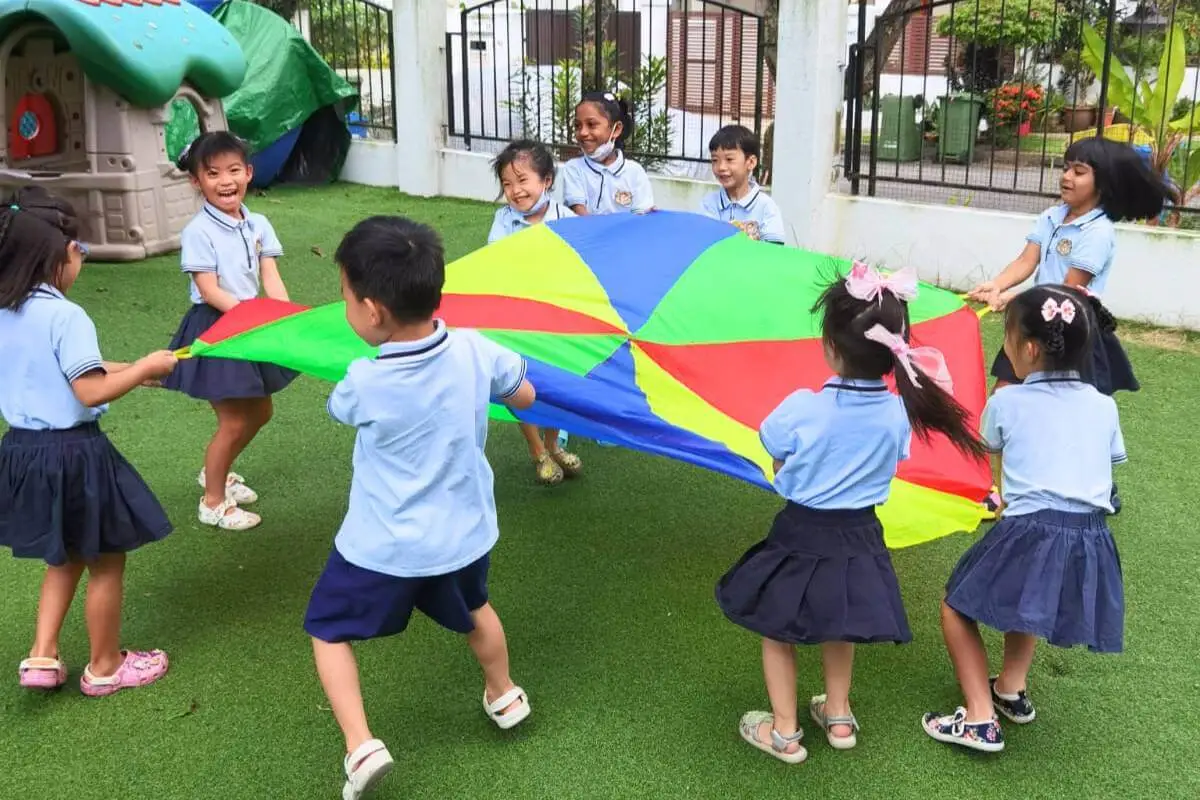Social development activities for preschoolers is crucial for their overall growth. These are the years when many essential skills need to be embedded towards future interpersonal skills, mental health, and academic achievements. Engaging them in social development activities helps establish relationships, teach empathy, and understand what is socially acceptable.
This article examines ten necessary activities that facilitate social development activities for preschoolers, thereby giving your child a good start to social life.
Understand the Social Development of Preschoolers
What do we mean by Social Development?
Social development refers to how kids learn to relate with each other, form relationships and acquire adequate social competence. It includes managing feelings, making friends, and navigating different sociability.
Why is Social Development so Important at this Age?
| Takes away shyness | Possessing vital etiquette in public makes kids more comfortable being around others. |
| Boosts Verbal Skills | Early encounters with people improve language and speaking abilities. |
| Cultivates Sympathy | Emotional intelligence depends on understanding and sharing emotions of those close or far from us. |
| Enhances Teamwork | The ability to cooperate with peers now paves the way for joint work tomorrow. |
Suggested Social Development Activities and Benefits
| Activity | Benefits |
| Play Dates | Sharing, turn-taking, conflict resolution |
| Storytelling | Empathy, creativity, perspective-taking |
| Group Games | Teamwork, communication, friendly competition |
| Arts and Crafts | Collaboration, self-expression, fine motor skills |
| Circle Time | Listening, group cohesion, public speaking |
| Outdoor Play | Physical health, teamwork, curiosity |
| Cooking/Baking | Cooperation, sensory experience, following instructions |
| Music and Movement | Coordination, rhythm, social bonding |
| Classroom Activities | Collaborative learning, group projects, peer teaching |
10 social development activities for preschoolers
Play Dates And Group Play
Playdates provide an opportunity for young children aged between three years old and six years old to interact with same-age peers in structured yet relaxed settings. They also learn how to share items, take turns playing games, hear music stories, read books, watch television shows together, resolve conflicts amongst themselves, etc. Regular play dates can help children build lasting friendships and a sense of belonging.
Organizing Successful Play Dates
| Invite a Small Group | Start with just a few kids to not overwhelm your child. This allows for better interaction and easier control. |
| Simple Activities Planned | Choose activities that promote interactions such as building blocks or drawing instead of complex, competitive ones. |
| Supervise but Don’t Interfere | Let children face the social challenges independently, only coming in when necessary. This enables them to acquire problem-solving and negotiation skills. |
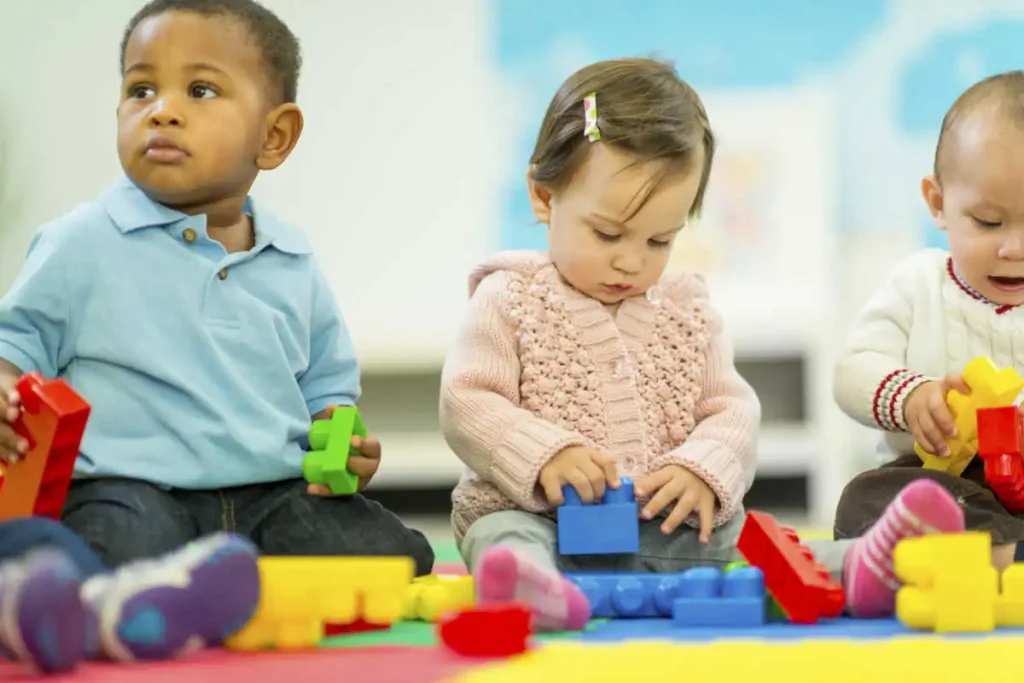
Storytelling And Role-Playing
Storytelling is an essential aspect of social development in children, and it helps them understand what others may be thinking or feeling towards certain issues. Children learn about feelings in different stories, consequences related to actions, and moral values in life through fables and tales.
Implementing Storytelling Activities:
| Create a Story Circle | Encouraging every child to share their story enhances listening and speaking skills among them while at the same time improving confidence in public speaking. |
| Use Puppets and Props | Enhance storytelling using puppets, costumes, props, etc. This will enable kids to relate more easily to, understand, and respond better to stories because they are visual learners. |
| Reenact Favorite Stories | Allowing kids to act on their favourite tales of fiction fosters imagination and cooperation abilities among these kids; hence, being creative with different characters, for example, princesses or dragons, could be interesting as well. |
Group Games And Activities
Preschoolers can learn how to follow the rules and cooperate with others during game-friendly competitions by playing “Duck Duck Goose”, “Musical Chairs”, and other similar group games that impart essential skills for proper social development.
Benefits Of Group Games
| Social Skills Development | They can play together and achieve more. Thus, this can help them understand the importance of teamwork and cooperation. |
| Group decisions | Games often require communication and negotiation. They help children to express themselves, listen to others and make |
| Promotes Physical Fitness | Numerous team games necessitate physical activity, promoting good health. Additionally, physical play may lead to improved cognitive abilities and emotional development. |
Arts and Crafts Projects
Preschool children get the opportunity to express their creativity through art while they interact with peers. Working in groups encourages collaboration and communication among young ones. Thus, through art or craft work, kids can be taught how to appreciate diversity in opinions and operate towards a common objective.
Collaborative Art Project Ideas
| Mural Painting | The learners paint a mural together, each contributing artistically. This fosters cooperation among individuals, leading to the promotion of unity among members. |
| Group Collage | Kids collect pictures, who then set up a group collage with discussions over each addition being made. It is an excellent way of understanding one another’s preferences and life encounters. |
| Themed Crafts | Engaging in themed projects like holiday decorations or seasonal art helps them understand cultural traditions and seasonal changes. |
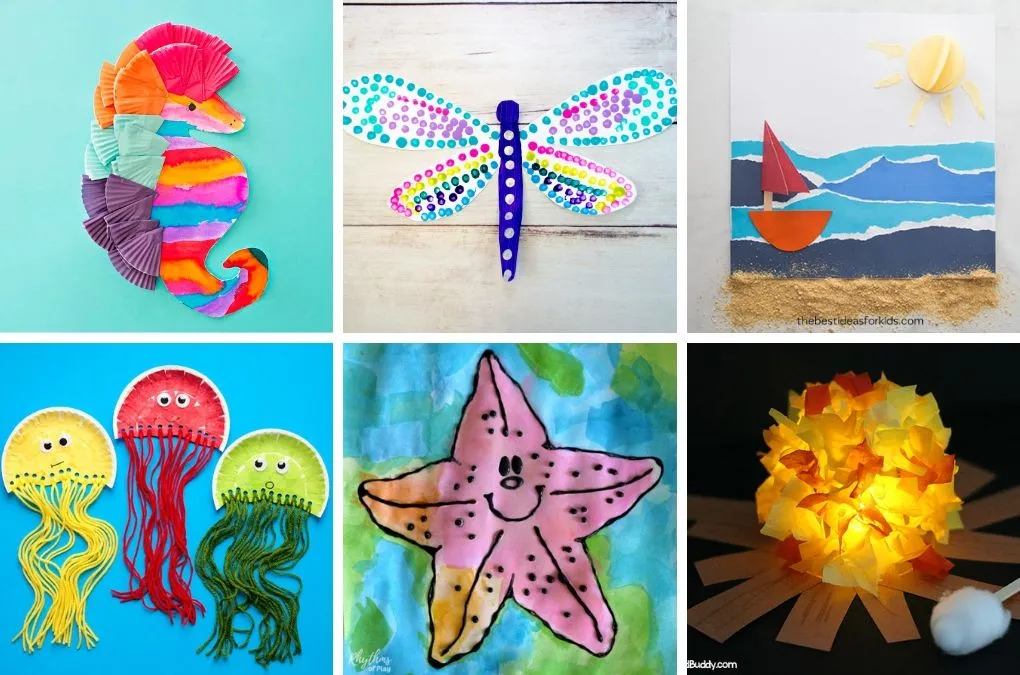
Circle Time Activities
It is an activity of sitting in a circle where songs and stories are shared, among other things, and it takes place during circle time for children seated around it. It encourages listening skills as well as group cohesion among the participants involved. Circle time may become part of children’s daily routine, creating a sense of security within them, thus making it easier for them to socialize effectively.
Activities for Effective Circle Time Sessions
| Sing-Alongs | Decide on songs that involve actions so that there can be participation when singing together, creating happiness. |
| Show-and-Tell | Each child should bring one item from home to school about which he/she speaks before a group. This also helps children learn about each other’s lives and interests. |
| Interactive Stories | Read out stories and ask questions to involve the children in the story. This makes them think critically and improves their understanding of what is being discussed. |
Outdoor Play and Nature Exploration
Outdoor play promotes physical health while enhancing social development through interaction with others. Together, exploring nature can encourage teamwork among kids and a curiosity that leads to inquisitiveness. Spending time outdoors reduces stress levels, hence making a person feel free to interact socially with others.
Socializing Outdoors Ideas
| Nature Walks | Organize group walks, discussing what you see. This can be a great way to learn about the environment and develop observational skills. |
| Gardening Projects | Working together to plant gardens and assign tasks amongst your students. This will help teach kids how to be patient, take care of things, and understand the life cycle of plants. |
| Outdoor Games | Playing games such as tag, hide-and-seek, or relay races may be helpful physically, encouraging cooperation among participants and fair treatment. |
Cooking and Baking Together
Cooking teaches young children cooperation, following instructions, taking turns, sharing, and then being able to taste different foods, which are some benefits of cooking together at school with preschoolers. Cooking involves using most senses, making these activities more engaging. When people cook together, a sense of community is created; hence, shared pride exists.
Simple Recipes for Group Cooking
| Mini Pizzas | It allows for creativity among children when they put their own toppings on the pizza base within a group work structure. |
| Fruit Salad | The kids can wash, peel some fruits, and then mix them up in one bowl. It is a fun way to make them eat healthy while learning about different types of fruit textures at once. |
| Decorating Cookies | Have some plain cookies and various decorative items for children to create their designs. This may be an exciting event which will encourage artistic tendencies and sharing among the kids. |
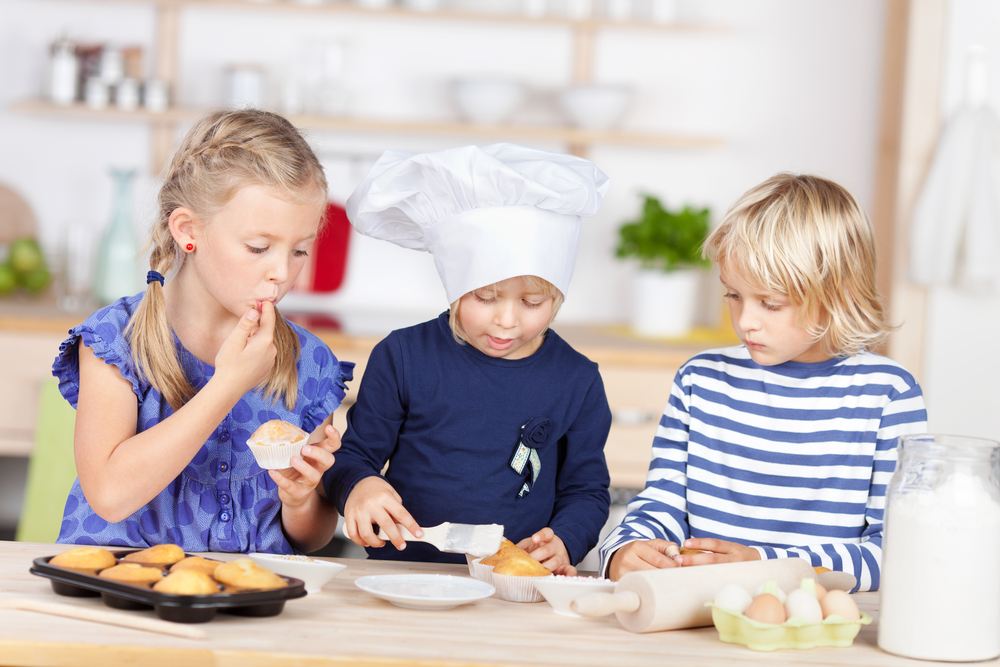
Music and Movement Activities
Music and movement activities, such as dancing or playing musical instruments, help with coordination, rhythm, and social bonding. These activities are often interesting for young ones as they can express themselves non-verbally.
Engaging Music Activities
| Dance Parties | Play different kinds of music to enable free dance. This can ensure that excess energy is released and that group movement is enjoyed. |
| Instrument Exploration: | Provide different types of instruments so kids can explore sounds together. It helps in auditory skills development and promotes a love for music. |
| Singing Games: | Teach songs that require group actions or call-and-response patterns. Memory improvement, listening skills enhancement, and group coordination are some major benefits of this activity. |
Structured Classroom Activities
Structured classroom activities, mainly cooperative learning or group projects, make children become team players instead of individuals trying to accomplish individual goals. These events that form part of the preschool curriculum enable students to acquire academic achievements and social skills at once.
Examples of Classroom Activities
| Group Projects | Divide them into small groups to work on a project like model building or creating a poster. Cooperation, planning, and problem-solving are some core traits encouraged through this approach. |
| Interactive Lessons | Involve all children through interactive whiteboards or debate forums when teaching them. When you take advantage of interactive lessons, learning is more enjoyable and inclusive. |
| Peer Teaching | Pair kids up so that they teach each other new skills or concepts at hand. This reinforces learning while developing leadership qualities along with communication abilities. |
Community Involvement and Field Trips
Taking children out for field trips or community activities helps them to see a different side of life and understand the world more broadly. These experiences help build a sense of belonging and responsibility among children.
Planning Community Activities
| Library Visits | Plan for group visits to the local library, where they can listen to stories or watch puppet shows. Most libraries have programs specifically designed for young ones. |
| Farm Visits | Plan on having tours of a farm to learn about animals and plants. As it provides an exciting opportunity, it is also educative since kids will connect with nature directly. |
| Community Events | Engage in community events such as fairs or festivals that teach children about their community. Such events are fun because, besides allowing different cultures to meet, they may facilitate social interaction, too. |
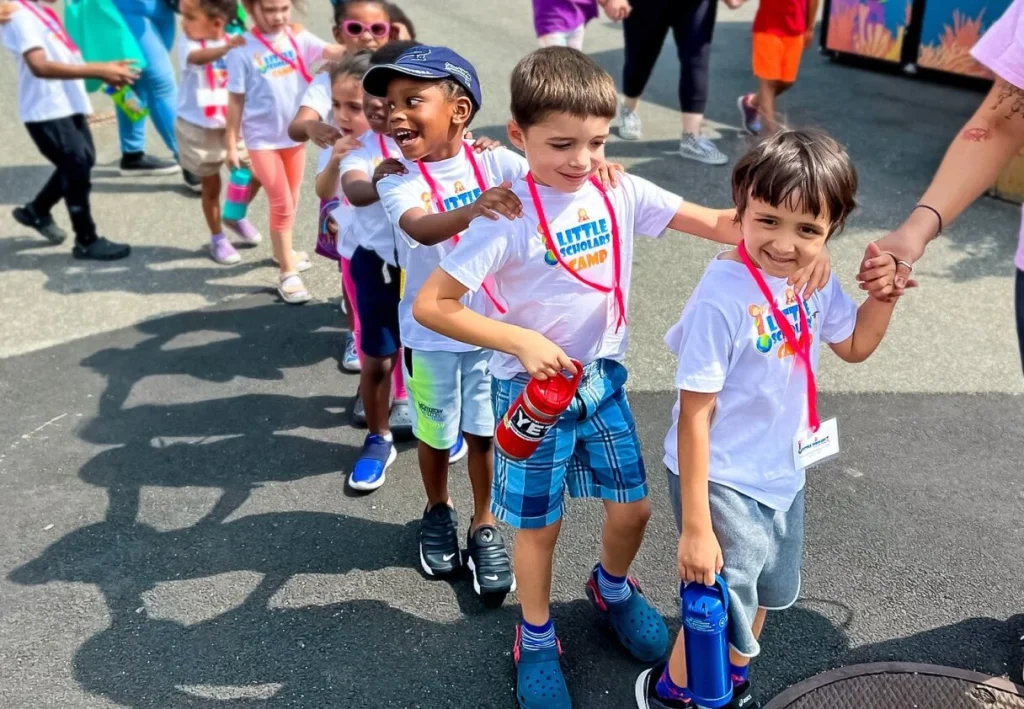
Conclusion
Social developmental activities for preschoolers are essential for their all-round growth. As parents and teachers incorporate these into their everyday schedules, children’s social skills, empathy, and self-esteem can greatly improve.
Above all, therefore, it would be better if we created provision whereby young ones could learn together, hence having a conducive environment for learning,
FAQs about Social Development Activities for Preschoolers
Q1: How often should my preschooler participate in social development activities?
Engaging your child in social development activities daily is beneficial for them. This aids in the reinforcement of social skills as well as creating strong relationships. Try to maintain a balance between structured and unstructured activities so that things do not become monotonous.
Q2: What if my child is shy or reluctant to join group activities?
Start with smaller groups consisting of familiar faces until your child gets used before you can increase the size of these groups and the complexity of tasks performed there. Although you must encourage participation, never force your kid into anything; otherwise, this will evoke anxious feelings in him/her. Always remember that trust takes time; hence, be patient and supportive enough.
Q3: Can social development activities help with behavioural issues?
Social development is important in improving communication skills, emotional regulation, conflict resolution and other behavioural areas. Ideally, such engagements could result in finding positive ways to channel his/her emotions while better socializing with others.
Q4: How can one tell if their child is socially developing?
Observe your child’s interactions, register progress in sharing, communication, and empathy, and seek feedback from the teacher or caregiver. Another way to follow up on this development is by journaling the milestones and notable interactions.
Q5: Are there any particular activities for children with special needs?
Numerous social development activities can be altered to fit children with special needs. If necessary, one should be sensitive to the individual requirements of his or her kid and adhere to a specialist’s advice. These activities will help foster inclusiveness; thus, every child would feel that they are an important part of the community in which they live.

Russell F. Jones, holding a Master in psychology from the University of Florida. He writes for Smart Parent Solutions, offering practical advice on parenting and child development. His engaging content helps parents navigate family life with confidence and ease. Russell enjoys sharing his knowledge and spending quality time with his family.
